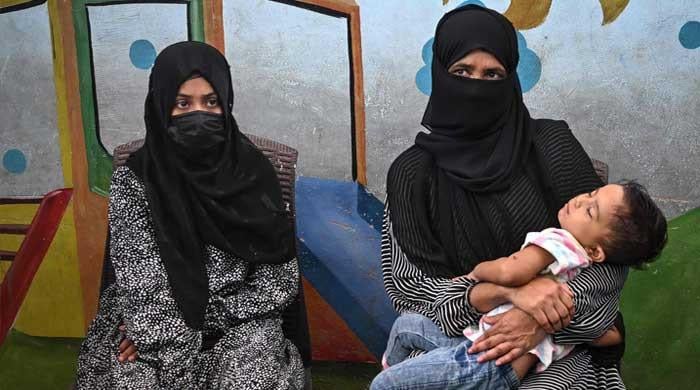Child Labor Persists in Pakistan: A Story of Exploitation
From the tender age of 10, Amina’s life has revolved around domestic chores in a middle-class residence in Karachi, Pakistan’s bustling metropolis. She is among countless Pakistani children engaged as household staff, an unlawful yet widespread practice that inflicts suffering on families frequently too impoverished to pursue legal recourse.
“I assist my mother with cutting vegetables, washing dishes, sweeping, and mopping. I despise working for this family,” expressed the 13-year-old, whose daily routine involves departing her Karachi slum at 7 a.m. and often returning after nightfall.
“We occasionally work on Sundays, despite it being our designated day off, which feels incredibly unjust.”
Approximately one in four households in Pakistan, a nation of 255 million inhabitants, employs a child as a domestic servant, predominantly girls aged 10 to 14, as indicated by a 2022 report from the International Labour Organisation (ILO).
Sania, another 13-year-old, receives $15 monthly for assisting her mother in maintaining an expansive luxury residence in the city. She is strictly prohibited from interacting with her employer’s children or handling their toys.
Note: To safeguard their identities, full names of interviewed children and parents were withheld.
Sania’s earnings represent half of her mother’s salary for equivalent hours, with their combined income totaling $46 — significantly below the minimum wage of 40,000 rupees ($140).
“I had aspirations of completing my education and becoming a doctor,” shared the eldest of five siblings, who, according to existing regulations, should remain in school until the age of 16.
A university professor, who preferred to remain anonymous, admitted to employing a 10-year-old boy, citing that children are “more affordable and obedient”.
“While I acknowledge the immorality and illegality of employing a child, at least he benefits from shelter and nourishment here,” he stated.
Hamza was entrusted to the professor’s care in Karachi by his parents, a journey of 450 kilometers (280 miles) from his impoverished village, to which he only returns sporadically each year.
His monthly compensation of $35 is directly disbursed to his father.
“In his village, his impoverished parents would likely have assigned him to labor in the fields without adequate sustenance,” the professor explained, while simultaneously admitting to feeling “uncomfortable” when his own children attend school while Hamza remains behind to perform cleaning duties.
Pakistan lacks a standardized definition of a child or child labor, although federal legislation prohibits children under 14 from engaging in work within hazardous environments, such as factories.
In Sindh province, with Karachi as its capital, employing a child as a domestic worker carries a maximum penalty of one year’s imprisonment or a fine of up to 50,000 rupees ($177). However, prosecutions remain infrequent.
Kashif Mirza, representing the NGO Sparc, a prominent child rights organization, characterized the practice as a form of “modern-day slavery widely accepted within Pakistani society, rendering children particularly vulnerable”.
“Society exhibits a preference for employing child domestic workers due to their lower cost and greater obedience. Employers often rationalize their actions by asserting that they are safeguarding the children, which is both untrue and illegal,” he explained.
Iqra, a 13-year-old domestic worker, tragically died in February as a result of physical abuse inflicted by her affluent employers in Rawalpindi, Islamabad’s neighboring city, allegedly due to missing chocolate from their kitchen.
Her father, Sana, initially expressed his intent to prosecute the employers following her death but subsequently disclosed that he had pardoned them.
Under Islamic law, which coexists with common law in Pakistan, the family of a deceased relative possesses the option to accept financial restitution from the perpetrators in exchange for forgiveness, thereby exempting them from prosecution.
“I was left with no alternative. How could I have financed legal expenses? I am already burdened with debts exceeding 600,000 rupees ($2,120),” he lamented.
“Furthermore, there was pressure from the family’s relatives to grant them clemency, and I eventually acquiesced,” he added.
He stated that he did not receive any monetary compensation from the family, an uncommon occurrence under Islamic law.
Following Iqra’s passing, he brought his other two daughters and two sons home.
“I ceased sending them to work because I cannot endure the prospect of losing another child,” he conveyed.
Mir Tariq Ali Talpur, the social affairs minister for the under-developed Sindh, asserted that “the penalties are insufficiently stringent” for both employers and parents.
He mentioned that authorities routinely conduct inspections and assume custody of young children employed unlawfully. However, the courts frequently return them to their parents following a nominal fine of approximately $3.50.
“This is why these incidents persist,” he concluded.
A Karachi couple accused of using an iron to burn a 13-year-old domestic worker named Zainab was granted bail for approximately $105 each in September.
“I fail to comprehend how they could be free. Does nobody perceive Zainab’s injuries?” questioned the teen’s mother, Asia, while pointing out severe burns on her daughter’s arms, legs, back, and stomach.
Asia, who is pursuing legal action against the offenders, acknowledged that they are “wealthy and perceive themselves as untouchable”.
“The impoverished, like ourselves, lack influence,” she lamented.



Comments (0)
No comments yet. Be the first to comment!
Leave a Comment